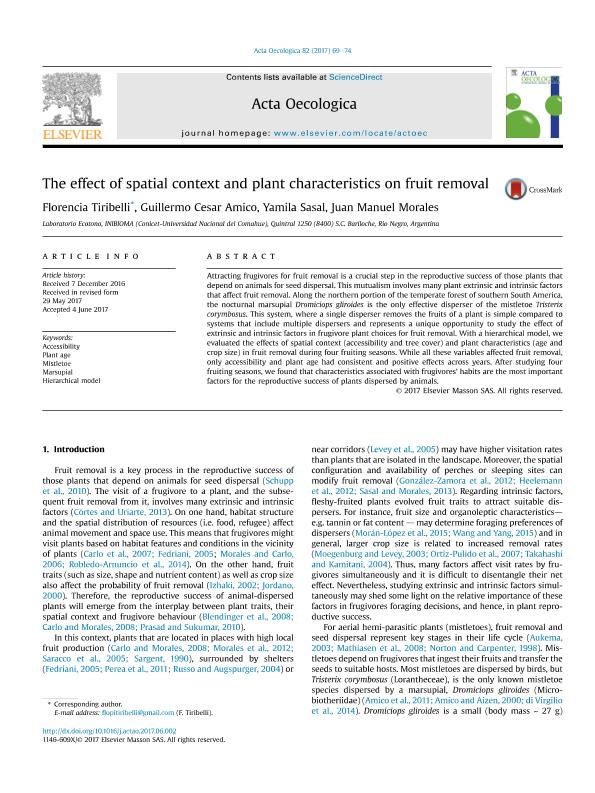Mostrar el registro sencillo del ítem
dc.contributor.author
Tiribelli, Florencia

dc.contributor.author
Amico, Guillermo Cesar

dc.contributor.author
Sasal, Yamila

dc.contributor.author
Morales, Juan Manuel

dc.date.available
2018-11-05T19:20:47Z
dc.date.issued
2017-07-01
dc.identifier.citation
Tiribelli, Florencia; Amico, Guillermo Cesar; Sasal, Yamila; Morales, Juan Manuel; The effect of spatial context and plant characteristics on fruit removal; Elsevier Masson; Acta Oecologica; 82; 1-7-2017; 69-74
dc.identifier.issn
1146-609X
dc.identifier.uri
http://hdl.handle.net/11336/63669
dc.description.abstract
Attracting frugivores for fruit removal is a crucial step in the reproductive success of those plants that depend on animals for seed dispersal. This mutualism involves many plant extrinsic and intrinsic factors that affect fruit removal. Along the northern portion of the temperate forest of southern South America, the nocturnal marsupial Dromiciops gliroides is the only effective disperser of the mistletoe Tristerix corymbosus. This system, where a single disperser removes the fruits of a plant is simple compared to systems that include multiple dispersers and represents a unique opportunity to study the effect of extrinsic and intrinsic factors in frugivore plant choices for fruit removal. With a hierarchical model, we evaluated the effects of spatial context (accessibility and tree cover) and plant characteristics (age and crop size) in fruit removal during four fruiting seasons. While all these variables affected fruit removal, only accessibility and plant age had consistent and positive effects across years. After studying four fruiting seasons, we found that characteristics associated with frugivores’ habits are the most important factors for the reproductive success of plants dispersed by animals.
dc.format
application/pdf
dc.language.iso
eng
dc.publisher
Elsevier Masson

dc.rights
info:eu-repo/semantics/openAccess
dc.rights.uri
https://creativecommons.org/licenses/by-nc-nd/2.5/ar/
dc.subject
Accessibility
dc.subject
Hierarchical Model
dc.subject
Marsupial
dc.subject
Mistletoe
dc.subject
Plant Age
dc.subject.classification
Otras Ciencias Biológicas

dc.subject.classification
Ciencias Biológicas

dc.subject.classification
CIENCIAS NATURALES Y EXACTAS

dc.title
The effect of spatial context and plant characteristics on fruit removal
dc.type
info:eu-repo/semantics/article
dc.type
info:ar-repo/semantics/artículo
dc.type
info:eu-repo/semantics/publishedVersion
dc.date.updated
2018-10-23T16:16:05Z
dc.journal.volume
82
dc.journal.pagination
69-74
dc.journal.pais
Francia

dc.journal.ciudad
París
dc.description.fil
Fil: Tiribelli, Florencia. Consejo Nacional de Investigaciones Científicas y Técnicas. Centro Científico Tecnológico Conicet - Patagonia Norte. Instituto de Investigaciones en Biodiversidad y Medioambiente. Universidad Nacional del Comahue. Centro Regional Universidad Bariloche. Instituto de Investigaciones en Biodiversidad y Medioambiente; Argentina
dc.description.fil
Fil: Amico, Guillermo Cesar. Consejo Nacional de Investigaciones Científicas y Técnicas. Centro Científico Tecnológico Conicet - Patagonia Norte. Instituto de Investigaciones en Biodiversidad y Medioambiente. Universidad Nacional del Comahue. Centro Regional Universidad Bariloche. Instituto de Investigaciones en Biodiversidad y Medioambiente; Argentina
dc.description.fil
Fil: Sasal, Yamila. Consejo Nacional de Investigaciones Científicas y Técnicas. Centro Científico Tecnológico Conicet - Patagonia Norte. Instituto de Investigaciones en Biodiversidad y Medioambiente. Universidad Nacional del Comahue. Centro Regional Universidad Bariloche. Instituto de Investigaciones en Biodiversidad y Medioambiente; Argentina
dc.description.fil
Fil: Morales, Juan Manuel. Consejo Nacional de Investigaciones Científicas y Técnicas. Centro Científico Tecnológico Conicet - Patagonia Norte. Instituto de Investigaciones en Biodiversidad y Medioambiente. Universidad Nacional del Comahue. Centro Regional Universidad Bariloche. Instituto de Investigaciones en Biodiversidad y Medioambiente; Argentina
dc.journal.title
Acta Oecologica

dc.relation.alternativeid
info:eu-repo/semantics/altIdentifier/doi/http://dx.doi.org/10.1016/j.actao.2017.06.002
dc.relation.alternativeid
info:eu-repo/semantics/altIdentifier/url/https://www.sciencedirect.com/science/article/pii/S1146609X16303587
Archivos asociados
